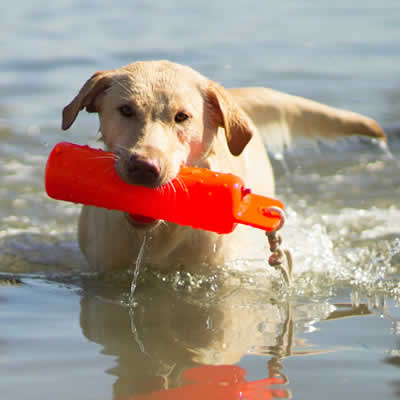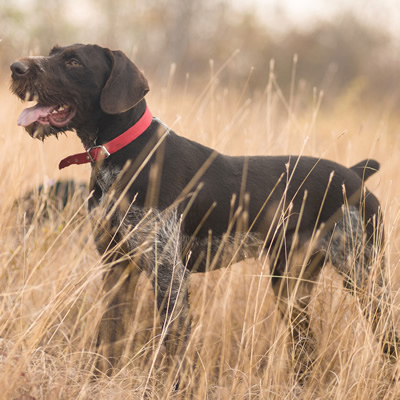Home » Blog » Three Ways to Care for Your Hunting Dog
Three Ways to Care for Your Hunting Dog

Dive in a lake. Retrieve the duck. Run through the mud to bring the duck back to you. Repeat. Hunting with your dog is a unique and bonding partnership that dates back thousands of years. Dogs aren’t just good at hunting, they also love it—maybe even more than we do. Whether you have a pointer, lab, spaniel, or hound, hunting dogs are reliable companions in everyday life and necessary partners on a hunt. Keeping them healthy is a must to prepare you both for your adventures together.
Happy Hunting with Your Dog
Keep these three things in mind before, during, and after hunting season:
1. Visit Your Veterinarian
Hunting dogs work hard! They’re exposed to more extreme temperatures, exercise, and wild animals than “normal” dogs. They’re more likely to get injured, too. Before the big season of conditioning, training, and hunting, get your dog a full physical exam. Then, during the mid-season (i.e. after the main hunting season), get a recheck to make sure all is well, even if you don’t see signs of discomfort or illness.
Look for the following during training and hunting (Game and Fish):
- Overheating. This usually presents as dark gums or a droopy tail.
- Frostbite. Early signs include red tissue in exposed areas such as ears, tail, feet, and sensitive places. If the flesh is turning gray, seek immediate medical help.
- Hypothermia. Watch for excessive shivering and decreased mental alertness.
- Cuts and Scratches. Be sure to part and search through thick fur.
- Fleas. Look for these tiny insects jumping above and hiding deep inside fur. Signs of infestation can also include excessive scratching, skin irritations, and bleeding.
2. Get Exercise and Practice
It’s important to get your dog in shape for hunting season. Like humans, they can’t wake up one day and run a marathon. It takes training and practice. No one wants their hunting dog to fatigue two hours into the hunt. According to Game and Fish, you should begin conditioning 6 to 8 weeks ahead, gradually increasing the amount of exercise prior to a big hunt. Try these activities:
- Retrieving. Stop as soon as interest wanes, so they always enjoy it.
- Swimming. Play fetch in the water to exercise all muscles, including the heart.
- Hiking. Strengthen hind leg and rear muscles for running and hills.
3. Groom Your Hunting Dog Carefully
Let’s face it, hunting is dirty. Mud, grass, rivers, and dead animals are a big part of hunting—everyone needs a bath afterward! Bathing your dog properly keeps you from bringing the mess and smells home, and helps you protect your pet from ticks and injuries.
- Eliminate dirt and odors. The Waterpik® Pet Wand PRO™ is a new bathing wand for dogs, and it’s probably the fastest way to get your dog clean after a hunt. The special WaterComb™ Spray penetrates thick, dirty fur, “combing” away grime and soap suds quickly.
- Inspect for ticks. These insects can hide in fur, which is a problem for dogs with longer hair. If you find a tick, be sure to remove all of it. The Humane Society recommends using tweezers to grasp the tic as close to the skin as possible, and then pulling it out slowly.
- Check for injuries. As you wash your dog, watch your dog’s behavior to uncover injuries you might have missed during the hunt, and follow up with your veterinarian as needed. Look for hidden scratches and cuts under the fur as you rinse.
Keep Your Hunting Dog Happy and Healthy
Caring for your hunting dog is a labor of love for both of you. Regular checkups, hunting games and practice, and careful bathing and grooming are all great ways to bond with your hunting dog for years of happy and healthy hunting together.



